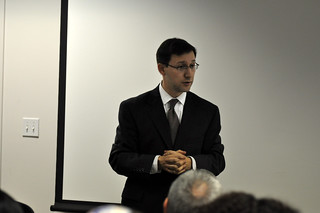Hezbollah is a complex organization, acting simultaneously as political party, social services provider, Shia religious movement, military apparatus, Iran ally and designated Foreign Terrorist Organization by the U.S. Department of State. However, it is the group’s covert activities abroad that are the least understood aspect of this organization, according to Dr. Matthew Levitt. During a discussion at START based on his recently published book, “Hezbollah: The Global Footprint of Lebanon's Party of God,” Levitt began to fill that gap.
Billed as the first comprehensive examination of these activities, “Hezbollah” is the culmination of more than nine years of research centering on newly declassified federal documents, court documents and interviews with intelligence agents and law enforcement officials. In it Levitt explores Hezbollah’s origins, violent ventures within Lebanon and its criminal and terrorist operations around the globe, including Hezbollah's involvement with Iran's struggle with Israel and the West.
To a diverse audience comprised of federal workers, scholars, START staff, interns and university students gathered at the START event, Levitt explained a major challenge to understanding and countering Hezbollah is that its organizational complexity impacts public perception.
“While many people within Lebanon are familiar with the group’s overt efforts related to political activities and social care, they sincerely deny Hezbollah’s covert and violent foreign operations,” Levitt said.
In fact, when Levitt had attended a U.S. government-sponsored, closed-panel discussion for American intelligence analysts, a Lebanese panelist denied the existence of an infamous Hezbollah member, Imad Mughniyeh, arguing he was nothing more than the creation of conspiracy theorists. Her proof, she said, was Hezbollah leader Hassan Nasrallah told her Mughniyeh didn’t exist.
Incredulous at this statement given what he knew about Mughniyeh’s background as a senior member and leader of Hezbollah’s military apparatus, Levitt left the conference and delved into research.
“I found that while a wealth of literature existed on Hezbollah, the best books contained only passing references to the organization’s activities abroad, with many caveats,” he recalled.
Thus, to fill this critical knowledge gap, he devoted nearly a decade to intensively studying the organization’s surreptitious activities.
In his book and talk, Levitt recounted numerous Hezbollah plots, preparation details, and the disturbing financial and logistical support networks that make the organization “so formidable.”
One of his most shocking examples described the group’s attempt to partner with a Philadelphia mobster, who was in reality an undercover FBI agent. The operation eventually exposed Hezbollah’s advanced money laundering strategy of passing off real international currency as counterfeit and dumping it around the world to avoid detection. This discovery also revealed that Hezbollah had somehow acquired funds designated by the U.S. government for Iraq reconstruction.
“A key theme that continued to appear throughout my research was how many times connections to each case tied back to the United States,” Levitt stated. His research revealed other surprises.
“What interested me the most,” Levitt admitted, “was how much of Hezbollah’s activities I had not heard of.”
This included an attempt to bomb the Israeli embassy in Bangkok with a massive fertilizer bomb, which authorities discovered only after the plan failed and was ditched. For this reason, Levitt said he finds the chapter on Southeast Asia one of the most interesting in the book.
Levitt concluded his talk by examining Hezbollah’s future strategy, arguing it is primarily engaged in a conflict with Israel to avenge Mughniyeh’s death, as well as held at Iran’s behest to target Israelis that undermine the Iranian nuclear program.
“Though Hezbollah’s skills have diminished after pulling back operations following 9/11, it appears to be actively recruiting stronger members and developing its financial and operational capabilities with the help of Iran,” he said.
For a deeper understanding of Hezbollah’s global clandestine activities, read Levitt’s “Hezbollah: The Global Footprint of Lebanon's Party of God.” An overview of the book, as well as purchasing information, can be found online.

